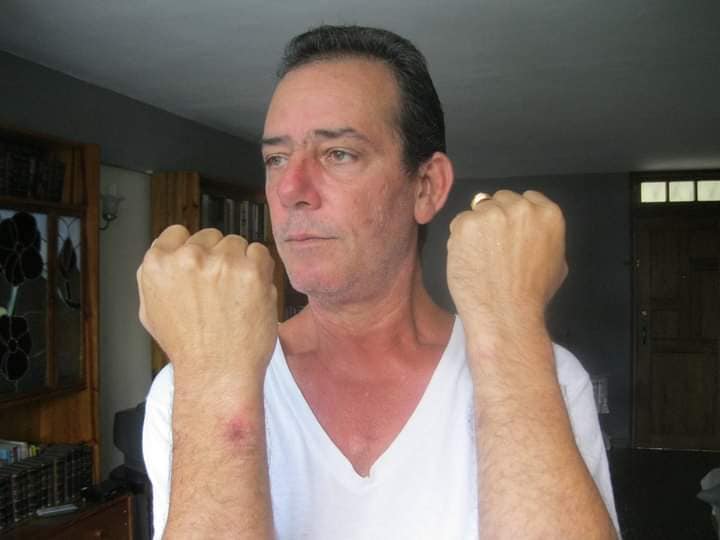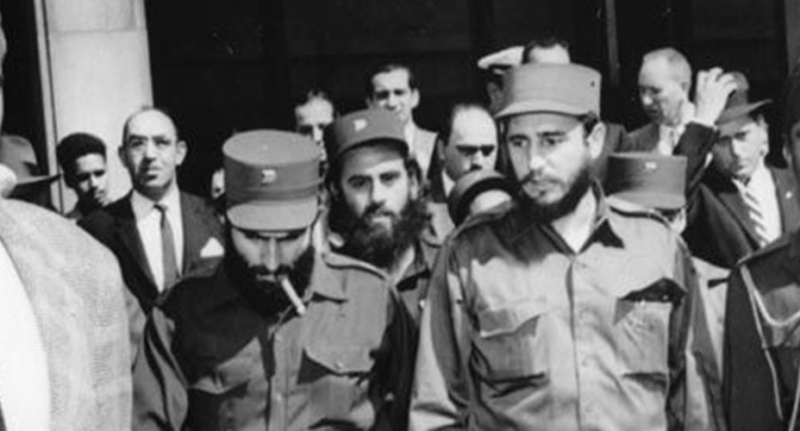In 2021, Cuban journalist and opposition activist Lázaro Yuri Valle Roca was arrested on charges of disseminating enemy propaganda and sentenced to five years in prison. He dramatically lost weight after a hunger strike but declined offers by the government to release him if he left the country.
Valle Roca is sixty-three. As his health faded, he listened to the implorations of his family and accepted the offer. Within hours he was on a plane to Miami with his wife, leaving behind their only daughter and two small grandchildren. He now lives in exile.
“My fight was in Cuba for the freedom of the island. I never wanted to leave,” he said in a phone interview from Pennsylvania, where he is currently living with relatives.
For years, he and other reporters had worked on the fringes despite independent journalism being effectively outlawed. There was a brief moment of hope when the Obama administration began engaging with Cuba. But that faded, and was replaced by outright hostility and a ruthless crackdown by the Cuban government on independent media coverage of opposition voices following mass street protests in July 2021.
“Almost all of them were targeted, harassed, or threatened,” said Ted Henken, a professor at the City University of New York who has written extensively about Cuban media.
Valle Roca’s departure marks another grim milestone, not least because of his family’s role in the history of the island. His grandfather Blas Roca Calderío was a labor union journalist and longtime communist leader prior to the 1959 revolution who held several important posts after Fidel Castro took power, including president of the National Assembly from 1976 to 1981. Roca Calderío chaired the committee that drafted Cuba’s first socialist constitution in 1976.
Valle Roca recalls serving coffee to Fidel and Raúl Castro, who were frequent visitors to his grandfather’s house, where he spent much of his youth.
“I listened to their discussions. Sometimes they became heated,” he recalled. “My grandfather was concerned about Fidel’s absolute power. Raúl always tried to resolve things. It was like a good cop, bad cop routine.”
One of Roca Calderío’s sons, Vladimiro Roca Antúnez, a Cuban Air Force pilot, became an outspoken dissident in the 1990s after the fall of the Soviet Union.
Roca Antúnez served five years in prison, accused of acts against the state and sedition as one of the authors of a document titled “La patria es de todos” (The Homeland Belongs to All), which laid out a damning critique of Cuba’s one-party political system and centrally controlled economy. He died, aged eighty, in July 2023.
His family were also close to Osvaldo Dorticós, who served as the president of Cuba from 1959 to 1976 before being demoted under the new constitution. He took his own life in 1983. “Those relationships marked my life,” said Valle Roca.
He was often in trouble at school, and was booted from military service for disobedience; he wound up getting work in an agricultural market. “I realized at a young age they were going to make my life impossible,” he said, referring to Cuban authorities.
When his grandfather died in 1987, the government declared three days of mourning. Valle Roca accompanied his family to the state funeral in the Plaza of the Revolution, sitting next to the coffin with his grandmother.
He vividly recalls an altercation with Raúl Castro when his grandmother was being ushered out. The family wanted a simple funeral, he says, but the government insisted on burying him with full military honors next to independence leader Antonio Maceo at a monument on the outskirts of Havana.
It was Valle Roca’s dissident uncle, Vladimiro, who eventually “showed me the way,” said Valle Roca, who began his journalism career working with a team of so-called Community Communicators seeking to provide an alternative to the heavily censored government media. They worked closely with other opposition leaders, including the Ladies in White, under constant state security surveillance.
“We couldn’t leave the house, as there were constant patrols keeping watch on us. We were prisoners in our own home,” he said.
Cuba accuses some independent journalists in Cuba of being political activists paid to file reports for American government-funded outlets such as Radio Marti, considered hostile, counter-revolutionary platforms by the Cuban government.

Valle Roca recognizes the thin line between journalism and politics in Cuba. He identifies more as a journalist, considering an independent media to be indispensable for political opponents.
“I prefer journalism. It’s a more objective way to work and denounce crimes. The pillar is the truth,” he said. “Political work is of no value without journalists reporting about it. Otherwise, you are just working in silence.” But at the same time, he added, the Cuban political system is so suffocating “it made all of us journalists into opponents of the regime.”
Even those journalists who stuck to the professional guardrails of independence and political neutrality were forced into exile in recent years. They include Abraham Jiménez and Carlos Manuel Álvarez, cofounders of the online magazine El Estornudo; José Jasán Nieves, editor of elTOQUE; and Elaine Díaz, the first Cuban to win a prestigious Nieman fellowship at Harvard University and founder of Periodismo de Barrio in Cuba.
New laws governing “social communication” and “cyberspace security” do not recognize independent media and make it a crime to publish news considered contrary to the “interest of the State.” That has resulted in people being arrested merely for clicking the like button on anti-government criticism on social media posts.
Cuba’s media policy can be neatly summed up by a famous phrase uttered by Fidel Castro during a speech in 1961: “Within the Revolution, everything; against the Revolution, nothing.” The declaration was a signal to Cuban intellectuals as to the limits of their freedoms in a country under siege by “Yanqui imperialism.”
Almost the only independent media in Cuba to avoid being shut down or jailed are the husband-and-wife team of Yoani Sánchez and Reinaldo Escobar, who run 14yMedio, a news website widely admired for its professional reporting, and the magazine OnCuba, run by the Cuban American entrepreneur Hugo Cancio, who divides his time between Miami, Madrid, and Havana.
While Sánchez and Escobar speak openly about democracy and human rights, they are careful to avoid any overt political activity. Even so, they have faced frequent detention and harassment by the authorities. Cancio is a major investor in trade with Cuba and has earned the trust of the Cuban government, but his journalists have also come under pressure from the government, and some have left the country.
While the crackdown in Cuba has crushed the independent media on the island, it has led to a flourishing of Cuban outlets in exile, including elTOQUE and El Estornudo. Despite the disadvantages of not being physically present on the island, they are able to use digital technology and anonymous sources to fill the void. “It’s true there’s a serious problem today,” Nieves told CJR. “Compared to five years ago, there is a much smaller number of independent journalists in Cuba. But that hasn’t stopped us reporting.”
Valle Roca feels there is some cause for optimism. “Things are not like before. The internet has helped us rip the tape off people’s eyes,” he said.
Other notable stories:
- Yesterday, Donald Trump said that he won’t debate Kamala Harris again before the election—though as the New York Times notes, it isn’t clear whether this was a firm conclusion or “the opening bid of a negotiation.” Harris, for her part, called on Trump to debate again, arguing that “we owe it to the voters.” Following the debate, Harris’s team has also made it clear that she intends to do more interviews going forward, including with local media in battleground states and what Politico describes as “unconventional outlets”; next week, she will reportedly sit down with the National Association of Black Journalists. But Harris is still facing criticism for curtailing media access—including, Axios reports, from an association representing White House photojournalists, which has accused Harris’s team of overseeing an “unprecedented reduction in access.”
- Writing in The Atlantic, Matteo Wong argues that fears about artificial intelligence being used to sway the election “make sense,” but that the real threat could come after the polls close, when the losing side might view AI as “an alluring new scapegoat” in relitigating the results. In other news about AI and the press, 404 Media’s Matthew Gault reports that the Garden Island, a newspaper in Hawai‘i, has created AI-generated avatars to report the news in video form—a practice that unionized journalists at the paper’s parent company have described as “digital colonialism.” And for CJR and the Tow Center for Digital Journalism, Anika Collier Navaroli argues that AI companies should hire people with journalism training to help them do real-time news better.
- The National Security Agency is launching a podcast—part of an unusual bid, as the Washington Post’s Ellen Nakashima puts it, “to publicize the role that signals intelligence, or SIGINT—the collection and analysis of electronic communications—plays in keeping America and its allies safe.” The show carries the title No Such Podcast—a play on “No Such Agency,” a nickname for the NSA reflecting the traditionally tight veil of secrecy around its operations—and focuses, in its first episode, on the agency’s role in the killing of Osama bin Laden. Jon Darby, a retired NSA official, told Nakashima that “it’s time for NSA to take some credit” for its part in the bin Laden operation.
- In Wednesday’s newsletter, we noted that Paul Marshall, an investor in the right-wing British network GB News, had completed a takeover of The Spectator, a conservative magazine in that country. Marshall is also in the running to acquire the publication’s sister newspaper, the Telegraph—but Semafor now reports that he is facing competition from a group of North American financiers led by Dovid Efune, a British-born journalist who once edited the Jewish publication Algemeiner Journal and acquired the New York Sun in 2021. A regional newspaper group in the UK is also thought to be in the mix.
- And David Knowles, a Telegraph journalist who launched and hosted an award-winning podcast about the war in Ukraine, has died. He was thirty-two. The Telegraph reported that Knowles, who was in Gibraltar when he died, is believed to have had a cardiac arrest; officials in the territory requested support from British counterterror police in their investigation, but said that “there are no specific concerns at this time with regard to the death.” Knowles’s father said that his son had an “intense” commitment to journalism.
ICYMI: An exiled Cuban journalist finds threats now cross borders
David C. Adams is a freelance journalist in Miami and the Caribbean correspondent for the Committee to Protect Journalists.
